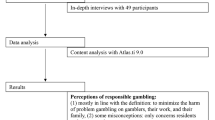Abstract
Gaming industry employees work in settings that create personal health risks. They also have direct contact with customers who might engage in multiple risky activities (e.g., drinking, smoking, and gambling) and might need to facilitate help-seeking by patrons or co-workers who experience problems. Consequently, the empirical examination of the processes and procedures designed to prepare employees for such complex situations is a public health imperative. In the current study we describe an evaluation of the Casino, Inc. Play Responsibly responsible gaming program. We surveyed 217 employees prior to and 1 month after (n = 116) they completed a multimedia driven responsible gambling training program. We observed that employees improved their knowledge of responsible gambling concepts from baseline to follow-up. The Play Responsibly program was more successful in providing new knowledge than it was in correcting mistaken beliefs that existed prior to training. We conclude, generally, that Play Responsibly is associated with increases in employees’ responsible gambling knowledge.


Similar content being viewed by others
Notes
One new employee failed to complete the baseline survey. We excluded another employee who had already participated in onsite training during a previous period of employment with Casino, Inc. We observed no meaningful differences between the follow-up participants and those who only completed the baseline survey. Specifically, two of the comparisons met the critical alpha value (i.e., compared with non-completers, completers had higher baseline scores for the What is addiction score and the Gaming regulation score). Further analysis determined that the source of these two differences is people who tended to have a large number of missing observations in their baseline survey. When we eliminated those individuals from the comparative analyses, none of the responder comparisons reach the criteria for statistical significance.
We conducted a McNemar test with Bonferroni correction only when at least 20 employees showed evidence of change in their responses from baseline to follow-up.
References
American Gaming Association. (2008). Responsible gambling statues and regulations (3rd ed). Retrieved August 18, 2009, from http://www.americangaming.org/assets/files/Statutes_and_Regs_FINAL_022009.pdf.
Blaszczynski, A. P., Collins, P., Fong, D., Ladouceur, R., Nower, L., & Shaffer, H. J. Responsible gambling: General principles and minimal requirements. Journal of Gambling Studies (in press).
Blaszczynski, A. P., Ladouceur, R., & Shaffer, H. J. (2004). A science-based framework for responsible gambling: The Reno model. Journal of Gambling Studies, 20(3), 301–317.
Giroux, I., Boutin, C., Ladouceur, R., Lachance, S., & Dufour, M. (2008). Awareness training program on responsible gambling for casino employees. International Journal of Mental Health and Addiction, 6(4), 594–601.
Gonzalez, R., & Wu, G. (1999). On the shape of the probability weighting function. Cognitive Psychology, 38(1), 129–166.
Joukhador, J., Blaszczynski, A. P., & Maccallum, F. (2004). Superstitious beliefs in gambling among problem and non-problem gamblers: Preliminary data. Journal of Gambling Studies, 20(2), 171–180.
Kassekert, L. M. (2009). Linda m. Kassekert, chairwoman, New Jersey casino control commission. In National Center for Responsible Gaming (Ed.), In their own words: Voices of responsible gaming. Washington, D.C.
Ladouceur, R., Boutin, C., Doucet, C., Dumont, M., Provencher, M., & Giroux, I. (2004). Awareness promotion about excessive gambling among video lottery retailers. Journal of Gambling Studies, 20(2), 181–185.
Ladouceur, R., Paquet, C., & Dube, D. (1996). Erroneous perceptions in generating sequences of random events. Journal of Applied Social Psychology, 26, 2157–2166.
Lanni J. T. (2009). J. Terrence lanni, chairman and ceo, mgm mirage. In National Center for Responsible Gaming (Ed.), In their own words: Voices of responsible gaming. Washington, D.C.
Ross, L., Lepper, M. R., & Hubbard, M. (1975). Perseverance in self-perception and social perception: Biased attributional processes in the debriefing paradigm. Journal of Personality and Social Psychology, 32(5), 880–892.
Shaffer, H. J., & Hall, M. N. (2002). The natural history of gambling and drinking problems among casino employees. Journal of Social Psychology, 142(4), 405–424.
Shaffer, H. J., Hall, M. N., & Vander Bilt, J. (1999a). Estimating the prevalence of disordered gambling behavior in the United States and Canada: A research synthesis. American Journal of Public Health, 89(9), 1369–1376.
Shaffer, H. J., Vander Bilt, J., & Hall, M. N. (1999b). Gambling, drinking, smoking, and other health risk activities among casino employees. American Journal of Industrial Medicine, 36(3), 365–378.
Statistics Canada. (1998). The gambling industry: Raising the stakes. Retrieved August 17, 2009, from http://www.statcan.gc.ca/studies-etudes/75-001/archive/e-pdf/4037-eng.pdf.
Stitt, B. G., Nichols, M., & Giacopassi, D. (2000). Perceptions of the extent of problem gambling within new casino communities. Journal of Gambling Studies, 16(4), 433–451.
Toneatto, T. (1999). Cognitive psychopathology of problem gambling. Substance Use and Misuse, 34(11), 1593–1604.
United States Department of Labor. (2009). Occupational outlook handbook, 2008–09 edition. Retrieved August 17, 2009, from http://www.bls.gov/oco/ocos275.htm.
Wohl, M. J. A., Young, M. M., & Hart, K. E. (2007). Self-perceptions of dispositional luck: Relationship to DSM gambling symptoms, subjective enjoyment of gambling and treatment readiness. Substance Use and Misuse, 42(1), 43–63.
Acknowledgment
Casino, Inc. provided the primary support for this survey. We are grateful to Bo Bernhard and Brett Arbabanel of the University of Nevada, Las Vegas, International Gaming Institute for their assistance with the development and completion of this study. We also would like to thank Erica Marshall, Ingrid Maurice, and Leslie Bosworth for their help with this study.
The Division also receives funding from bwin Interactive Entertainment, AG, the National Institute of Mental Health (NIMH), National Institute of Alcohol Abuse and Alcoholism (NIAAA), National Institute on Drug Abuse (NIDA), the Massachusetts Council on Compulsive Gambling, and the State of Nevada Department of Health and Human Services. The authors of this article take the responsibility for its content and do not personally benefit from their work with gaming-related companies (e.g., stocks, etc.).
Conflict of interest
The authors report no conflicts of interest. The authors alone are responsible for the content and writing of the paper.
Author information
Authors and Affiliations
Corresponding author
Rights and permissions
About this article
Cite this article
LaPlante, D.A., Gray, H.M., LaBrie, R.A. et al. Gaming Industry Employees’ Responses to Responsible Gambling Training: A Public Health Imperative. J Gambl Stud 28, 171–191 (2012). https://doi.org/10.1007/s10899-011-9255-z
Published:
Issue Date:
DOI: https://doi.org/10.1007/s10899-011-9255-z




